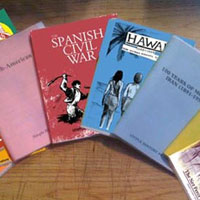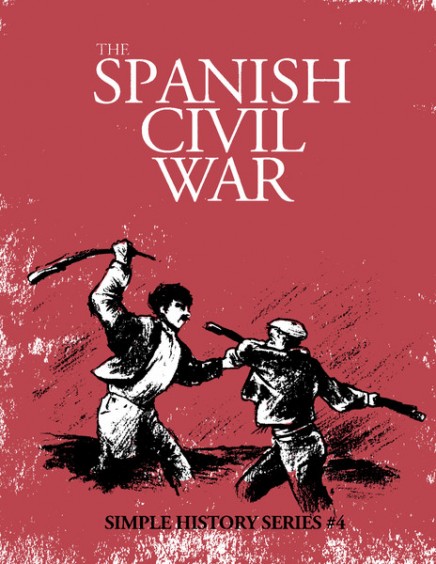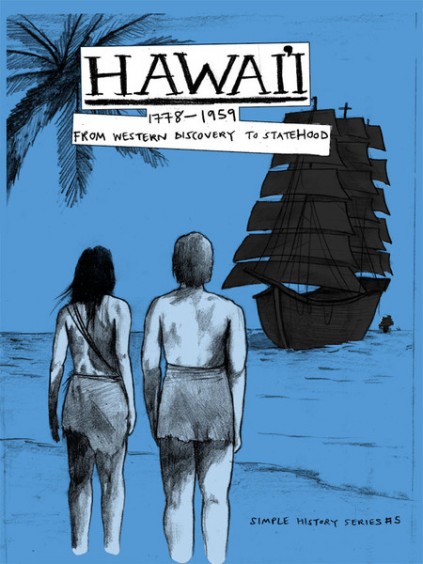 J Gerlach: Simple History Series (Microcosm Publishing)
J Gerlach: Simple History Series (Microcosm Publishing)
The history textbook might seem like an odd choice to adapt to a zine format. On a shelf full of comics, perzines, and essays, you wouldn’t really expect to find a history of modern Iran or the Nez Perce Indians. J Gerlach’s Simple History series (Microcosm), however, aims to change that. Each edition chronicles a decisive moment or movement in world history, condensing a story to the 50-page chapbook format. These books provide an insightful and informative antidote to the bulky historical tome usually found at schools or libraries. Additionally, the presentation breaks significantly with the mainstream idea of “history;” a sort of micro-People’s History of the United States, Gerlach looks at these events with a leftist, anti-imperialist, and sharply critical approach that’s in contrast to many established historical interpretations.
#4: The Spanish Civil War – If readers have learned about the Spanish Civil War at all, it was probably with an eye to American sensibilities. Gerlach does something quite different; in his treatment of the Spanish Civil War, he frames the struggle of the Republican dissidents and the traditional Nationalists as a classic underdog story gone wrong. The Republicans are union members, intellectuals, and working-class laborers trying to gain the right to participate in society, while the conservative Nationalists are trying to preserve the old way of king and country. Gerlach emphasizes the Nationalists’ access to outside help from other Nazi groups in Europe (which later allowed them to overpower the Republicans), and the U.S.’s decision to help their professedly anti-Communist leader, Francisco Franco. There’s even a brief detour into Picasso’s famed Guernica painting, based on one of the worst tragedies of the war. The story ends on a bleak note, as Franco institutes censorious and repressive dictates in Spanish society, but the message is clear – strict adherence to tradition can cause a society to go to dangerous extremes.
#5: Hawaii 1778-1959, From Western Discovery to Statehood – Gerlach takes on a part of our own history that we might not be familiar with, mostly because a lot of it reflects badly on the U.S. His history takes us through the discovery of Hawaii and its exploitation for the sugar crop; the mass immigration and assimilation of Asian workers; the U.S. and Sanford B. Dole (of the fruit company) interventions into Hawaiian monarchy and rule; and finally Hawaii’s annexation as a territory, Pearl Harbor, and statehood. Gerlach doesn’t hold back when detailing the annihilation (and later commercialization) of Hawaiian culture, or the U.S.’s somewhat racist outlook toward its people, but he is hopeful in the end that something of the real Hawaii may yet survive.
#9: The Congo, a European Invention – By far the most emphatic of Gerlach’s histories, his Congo book is an amazing read. In about fifty pages, Gerlach takes us through the exploration, colonization, and ruination of the Congo, all the while repeating that the Congo’s history is by no means unique in Africa. From Livingstone to King Leopold II to Joseph-Desire Mobutu, Gerlach’s book is an exhaustive look at war tensions, European intervention in Africa, and current international policy toward failed states. Unlike his earlier stories, however, there is little cause for hope at the end of the zine. The Congolese’s history is a tragedy, but one that demands our attention, as Gerlach seems to say.
The Simple History series is an entertaining and not-to-be-missed look at what is typically seen as a dry and stuffy subject. Gerlach’s caricatures, maps, and infographics, not to mention bright covers, represent a new and vibrant approach to history. This is history as presented by and to the modern, cosmopolitan, liberal thinker. Learn something new, and learn to question – with Simple History.




